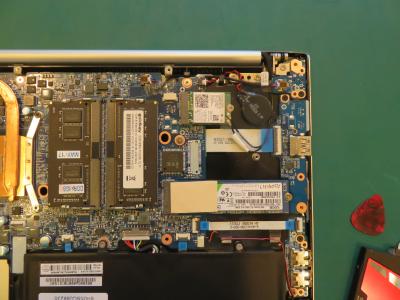
System76 sells the Galago Pro. Clevo manufactures this laptop as the Clevo N130BU. Sager sells the same ultrabook as the Sager NP3130.
The F2 key selects BIOS and the F7 key enters the boot device menu.
Sager has a copy of the user manual on their website. I have a local copy linked here. I forget where I found this Clevo service manual.
I also have a copy of the Clevo N141WU service manual.
The Galago Pro has a SIM card slot. Clevo describes 3G/LTE as a "factory installed option". This image (click on it for full size) shows the bottom of the Galago Pro with the case removed. On the right edge of the ultrabook you can see a silver metalic connector - that is the SIM card slot. The SIM card is on a small daughterboard. A white cable connects the daughterboard to the mainboard. On the mainboard there appears to be an unpopuplated pad near where the white cable connects. The letters "3G LTE" appear next to the unpopulated pad.
Nothing else worked when it came time to update the firmware. And honestly, as a longtime debian user, PopOS is pretty good and getting better with every release. I kept the old disto list below for my reference in case I need it for some reason later.
PopOS is an extension of Ubuntu. Here's the source.list file for PopOS 20.04. As you can see it is Ubuntu 20.04 with the addition of a pop-os repo.
# deb cdrom:[Pop_OS 20.04 _Focal Fossa_ - Release amd64 (20200514)]/ focal main restricted deb http://us.archive.ubuntu.com/ubuntu/ focal main restricted universe multiverse deb-src http://us.archive.ubuntu.com/ubuntu/ focal main restricted universe multiverse deb http://us.archive.ubuntu.com/ubuntu/ focal-security main restricted universe multiverse deb-src http://us.archive.ubuntu.com/ubuntu/ focal-security main restricted universe multiverse deb http://us.archive.ubuntu.com/ubuntu/ focal-updates main restricted universe multiverse deb-src http://us.archive.ubuntu.com/ubuntu/ focal-updates main restricted universe multiverse deb http://us.archive.ubuntu.com/ubuntu/ focal-backports main restricted universe multiverse deb-src http://us.archive.ubuntu.com/ubuntu/ focal-backports main restricted universe multiverse deb http://apt.pop-os.org/proprietary focal main # deb-src http://apt.pop-os.org/proprietary focal main
There is also a system76 ppa in the sources.list.d folder:
deb http://ppa.launchpad.net/system76/pop/ubuntu focal main deb-src http://ppa.launchpad.net/system76/pop/ubuntu focal main
Works great with openbox and i3. I've moved away from the Windows-like desktop environments, so no comment on the gnome or kde stuff.
Works ok. Using 17.10 as my main desktop now. I used some of the hidpi adjustments listed below. I did not install the system76 PPA. Has a problem with single keys sometimes running on. Occasionally freezes up and needs to reboot (maybe once per week). Suspend/resume works fine.
System76 preloaded my Galago Pro with Ubuntu 17.04 (with the System76 PPA and packages) and so far that has been the most stable configuration. All other distros have had problems with suspend/resume. (edit - not anymore, 17.10 works) I don't know why this is true.
Debian 9 installs cleanly and works ok with the high dpi adjustments described on this page. However I experienced a serious problem resuming from suspend. Sometimes resume would work but often I had a black screen and had to reboot.
I use gnome with the wayland compositor (as installed by debian 9). I set the dpi in gnome/wayland by adding this line to my ~/.Xresources file and rebooting:
Xft.dpi: 150
Many common apps have a magnification setting that applies to its windows. For instance in Google Chrome the default zoom can be configured in the settings window and VirtualBox allows a default magnification in each virtual machine settings.
When I originally started Debian the grub menu was tiny. I fixed this by setting the GRUB screen resolution in /etc/default/grub. Add or uncomment the following line. Note that this applies only to the startup GRUB menu, it does not set the screen resolution for the linux kernel or X.
GRUB_GFXMODE=800x600
Then in debian/ubuntu use the update-grub command or in rhel/fedora/centos use
grub-mkconfig -o "$(readlink /etc/grub2.conf)"
The printing in the virtual console will be very small. It can be enlarged to a more rational size by changing the console font:
dpkg-reconfigure console-setup
Select UTF-8, guess the optimal character set (unless you know better), then select the Terminus or TerminusBold fonts and then the 16x32 version of the font. Reboot.
The Galago Pro has a 2.5 inch SATA drive bay. Which is great for expandability but it takes up a lot of space inside the laptop. That's why ultrabooks which don't have SATA drive bays (just about EVERY other ultrabook) has way better battery life. If the designers remove that SATA bay and use the space for battery then they could probably double the battery life. That being said, my experience of "real world" battery life is about 3.5 hours. Hopefully the next version will remove the SATA bay and have a bigger battery.
The fan can be turned on and off by pressing the Fn key and the 1 key at the same time.
From time to time the keyboard will repeat a single character. It seems to happen when I type quickly. Will post more when I have time to investigate
The Galago Pro has Intel HD Graphics 620 on board:
root@GalagoPro:/home/andrew# lshw -c video
*-display
description: VGA compatible controller
product: HD Graphics 620
vendor: Intel Corporation
physical id: 2
bus info: pci@0000:00:02.0
version: 02
width: 64 bits
clock: 33MHz
capabilities: pciexpress msi pm vga_controller bus_master cap_list rom
configuration: driver=i915 latency=0
resources: irq:128 memory:db000000-dbffffff memory:90000000-9fffffff ioport:f000(size=64) memory:c0000-dffff
There's a good article on phoronix regarding the performance of this chipset on linux. Summary: not good for games machine. Fine for business/productivity. My Debian 9 install defaulted to the i915 driver.
There's a thread on Notebook Review regarding this model laptop.